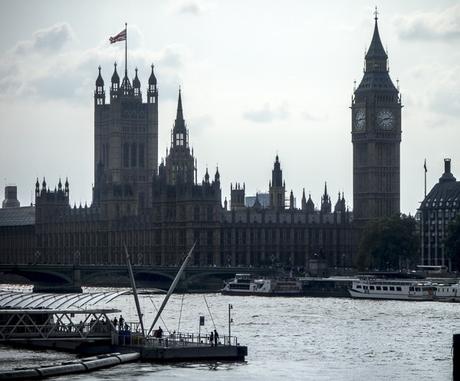 Welcome to British Isles Friday! British Isles Friday is a weekly event for sharing all things British and Irish - reviews, photos, opinions, trip reports, guides, links, resources, personal stories, interviews, and research posts. Join us each Friday to link your British and Irish themed content and to see what others have to share. The link list is at the bottom of this post. Pour a cup of tea or lift a pint and join our link party!
Welcome to British Isles Friday! British Isles Friday is a weekly event for sharing all things British and Irish - reviews, photos, opinions, trip reports, guides, links, resources, personal stories, interviews, and research posts. Join us each Friday to link your British and Irish themed content and to see what others have to share. The link list is at the bottom of this post. Pour a cup of tea or lift a pint and join our link party!
Last week, I wrote about the Prime Minister's prorogation of Parliament, a move that precipitated this week's drama in British politics. Heather reviewed The Chocolate Maker's Wife by Karen Brooks. Tina reviewed The Nanny by Gilly MacMillan. Vickie reviewed a 2002 film set in Ireland, Evelyn.
I planned to write, this week, about Downton Abbey in anticipation of the movie opening on September 20. Since next week is shaping up to be pretty interesting, too, it may be September 20 before I get to post about my excitement. I guess that will be a good way to celebrate the opening.
Politics at Westminster were dramatic this week, so I want to see if I can piece that together for myself and others.

A timeline might help.
Tuesday
This was the first day that Parliament was back in session after they learned that the Prime Minister planned to prorogue them next week.
At the beginning of the day, Prime Minister Boris Johnson and his Conservative Party, in partnership with the small Democratic Unionist Party from Northern Ireland, held a majority of one person in the House of Commons. As Johnson began his address, a member of the Conservative Party defected by taking a seat on a bench with Liberal Democrats. From that moment, Johnson no longer held a majority.
Parliament seizes control
Parliament, then, passed a bill to control their own agenda. I'm still a little confused about this, but apparently in the normal scheme of things, the Prime Minister and the ruling party control the agenda. Seizing control was the first step that Parliament needed to take in order to get to vote on the bill that they wanted to vote on this week - to disallow the possibility of a no-deal Brexit.
Conservative MPS kicked out of the Party
Twenty-one members of the Prime Minister's own party, the Conservatives, voted for Parliament to seize control. These twenty-one members were kicked out of the Conservative Party. This means that they won't have Party support to run for reelection to their seat in Parliament. Several appear prepared to retire or give up politics. A few may be so popular in their districts that they can run successful campaigns as independents or by joining another party.
Some of these rebel Members of Parliament have high profiles:
- Ken Clarke. Clarke is known as the Father of the House, an informal title given to the longest serving member. He's been a Conservative MP for 49 years and has held many positions in the cabinets of Margaret Thatcher, John Major, and David Cameron.
- Nicholas Soames. The grandson of Winston Churchill had a military career, served as a senior attendant to the Prince of Wales, and has been an MP since 1983.
By the end of Tuesday, the Prime Minister had lost control of twenty-two MPs and was well below the level of having a majority control of Parliament.
Wednesday
Bill passes to prevent no-deal Brexit
The House of Commons passed a bill that limited the Prime Minister's options to two:
- Reach a new deal with the EU by October 19
- Get Parliament's approval for a no-deal exit by October 19
If neither of those happens, the bill requires that the Prime Minister request an extension with the EU, suggesting January 2020, but the EU will have to approve both the extension and the date.
That bill moves to the House of Lords. This is the upper house, like our Senate, but the Lords aren't elected. A person becomes a member by appointment, heredity, or function (for example, the bishops of the Church of England are members).
Historically, the House of Lords could block bills, but no more. They can amend and delay them. One possibility was that the House of Lords would delay this bill until prorogation. But they pledged in the wee hours of Thursday morning that they would return the bill to the House of Commons by 5pm London time on Friday.
House of Commons rejects General Election
The Prime Minister, now in danger of being told that he can't do what he promised he would do - leave the EU with or without a deal on October 31st, called for a General Election on October 15. This means that all the seats of the House of Commons would be up for election. The political party with the most seats would be able to form a government, choose a Prime Minister, and manage the Brexit process.
The Prime Minister can call for an election, but he has to get a two-thirds majority vote from the House of Commons to approve it. He didn't get the two-thirds majority because the Labour Party and other opponents of the Prime Minister want the bill that prevents a no-deal Brexit to pass first.
What to Watch for Now
The House of Lords should finish their work on the bill to prevent a no-deal Brexit on Friday. On Monday, the House of Commons will take it back and work through any amendments that were added by the House of Lords. Also on Monday, expect another vote on a General Election.
More to come....

About Joy Weese Moll
a librarian writing about books
